Today is Global Youth Service Day and a great time to not only highlight youth who are making a difference through service to others but to also share a few must-haves for all youth service programs. Sarah Fanslau, Vice President of Youth Programs shares her thoughts.
1. Emphasis on young people leading the way
When adults fail to let youth lead, they often inadvertently reinforce the idea that youth are too young or too inexperienced to make a difference. While a young person’s ability to take the lead will vary based on age, skills, and experience, when it comes to figuring out what they care about and planning/facilitating service projects, it’s vital that youth are in the driver’s seat.
2. In-person and online learning
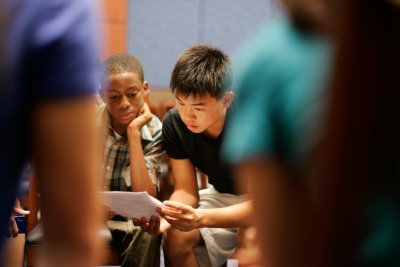
Service, like everything else, has been impacted by advances in technology. However, as research I’ve conducted on youth and digital technologies shows, that the internet is not an inherently democratizing entity1. While it can be great at helping youth already interested in civic engagement take their work to the next level, technology isn’t necessarily the tool to use to get youth new to service engaged. To support deep learning through service for ALL youth, it’s vital that youth have in-person opportunities for skill-building, in addition to online support materials.
3. Diverse participants
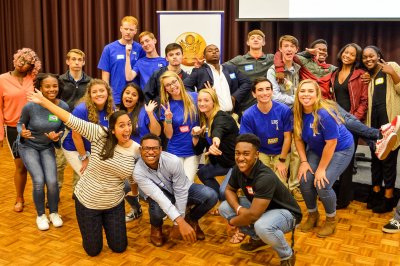
For youth to learn what it means to be active and engaged citizens through service, they need to be able to practice that work in communities that look and feel like the real world. Too often, youth are confined to doing service with a small group of their peers and often in school environments that may lack the diversity and difference of opinion found in their community at large.
Students In Action focuses on engaging and bringing together a diverse mix of youth who can learn from and with others of different background and belief. Further, the program focuses on building bridges between youth and their communities, including organizations that help those in need, as well as corporations, parents, elected officials an more. Learning how to navigate difference and come to consensus is a skill youth can and should build through service, but it’s only when we prioritize diversity and real community engagement that that learning takes shape.
4. An intentional focus on confronting bias and stereotype
Youth often go out to serve without first examining who they are, the set of prejudices and stereotypes that they have formed through their life, and how those things might impact who or how they serve.
Students In Action explicitly focuses on this, helping youth recognize and understand their implicit biases and reflect on them in the process of serving.
5. Goals that youth work to meet throughout their engagement their engagement
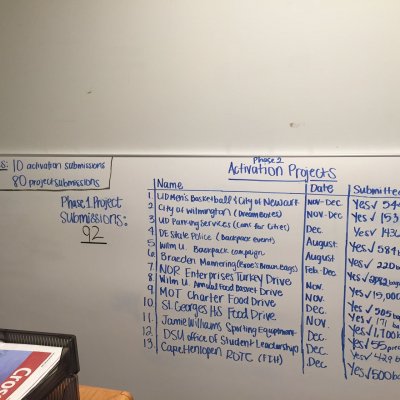
In the same way that programs should have goals for youth and community impact, high-quality programs have goals for youth to work towards and against in the process of their participation. Students In Action has six goals that youth work to achieve each year. These goals largely mirror the IPARDE or service-learning process, which is the research-backed intervention through which deep skill-building occurs.
6. Programmatic goals and outcomes
Service is a common good. So, it can be easy to fail to explicitly define what we want youth to learn, or how we are expecting them to grow, through service projects or programs. But setting specific youth outcomes and defining learning pathways is vital to delivering high-quality and impactful youth service programs.
7. Dedicated on-the-ground support for youth and adult advisors
Multiple layers of support and guidance offer youth the best opportunity to find their purpose and build critical skills through service. While youth are never too young to make a difference, we also know that support from caring adults is vital in helping youth navigate challenges and codify learning. Too often, youth lack access to proper supports.
Additionally, at the school or organization level, a teacher or advisor often serves as a support for youth engaged in service. But in many cases, those support staff may themselves have questions about what meaningful hands-on service looks like and feel less than confident navigating the tough conversations that arise when youth are asked about the problems they want to address. Further, it can be hard as adults to learn when to step in and when to let youth lead the way.
Training caring adults that are supporting youth in service is vital to ensuring youth get the most out of the process, while at the same time providing significant skill building for those caring adults.
Students In Action is run by on-the-ground staff in each community where we are located. In each community, we provide training and support to the youth and adults that participate in our programs.
8. An on-going process
Frequently, service is thought of in terms of ‘hours’ or ‘projects.’ But programs that provide a transformational experience for youth are those that are more than one-off, instead of focusing on supporting youth in learning over time.
Students In Action is a 3-year program that helps youth develop confidence in their ability to make a difference and build the skills to do it well.
9. Focus on recognition and celebration
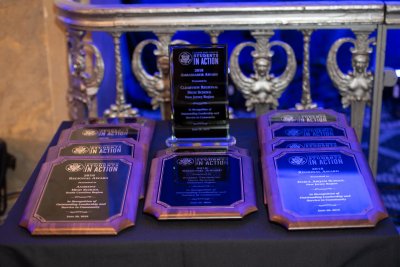
There are lots of excellent youth service programs out there, but many forget one simple thing—the importance of recognition and celebration. Recognition helps give those already serving the fuel they need to go out and do more and inspires those not engaged to get involved.
10. High-quality reflection
Reflection isn’t something to do at the end of a project—great youth service programs combine it with each step in the journey to help participants cement learning gains and continuously think about ways to improve.
11. Connections to a larger national and global community unity
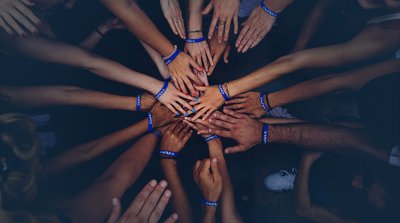
Taking action on issues that youth care about in their local communities is a significant first step. But transformational youth service programs go further and connect youth to a larger story of service in the country or world. At Multiplying Good, we do this through our annual Jefferson Awards held in Washington D.C. each June. Every year, student teams from across the country come together with grassroots unsung heroes, employees taking part in our corporate recognition program and national winners to celebrate the power of service.


